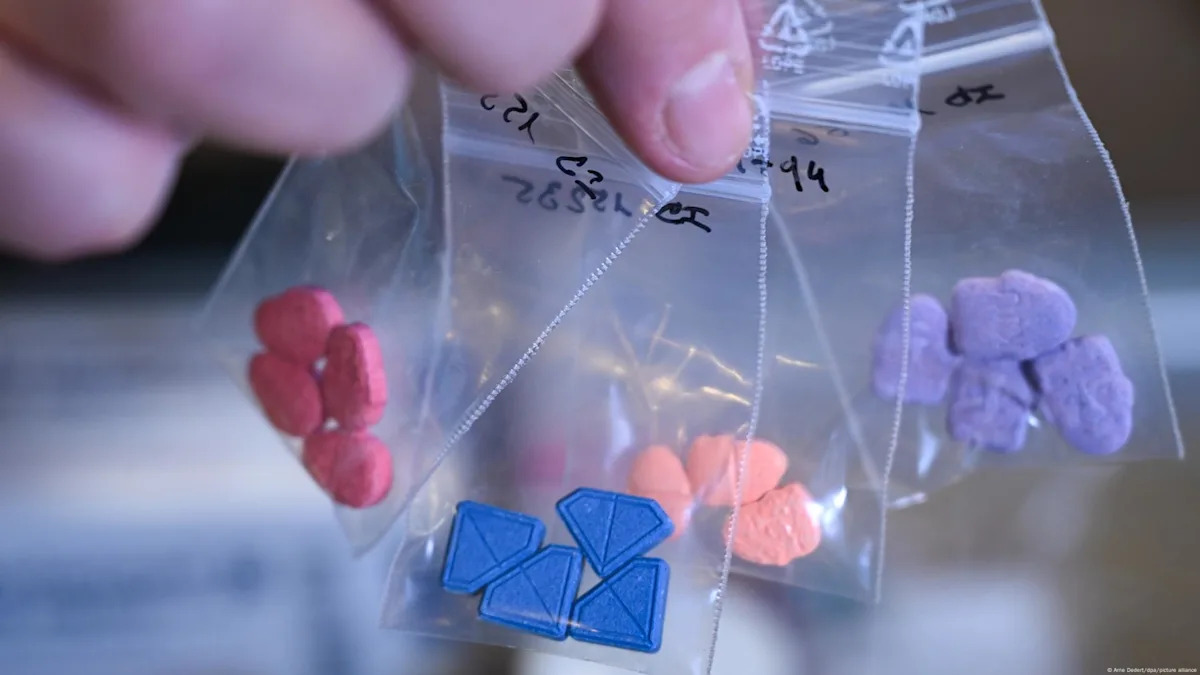Synthetic drugs have been increasingly straining German law enforcement, with authorities reporting growing production capacity and more trafficking.
Police have seized over 1,800 kilograms of new psychoactive substances in 2024, more than three times the previous year, as ketamine and potent synthetic opioids surge.
Officials have warned that labs are cranking out tons in weeks, and smugglers have been changing routes and methods.
In other news, Germany’s economy minister says Berlin is working to resolve an urgent shortage of chips needed by the auto industry.
Here are the latest headlines from Germany on Friday, October 24:
Germany seeks solution to Nexperia chip supply dispute
The dispute over chipmaker Nexperia, whose supply problems have hit Germany’s auto industry, remains unresolved, Economy Minister Katherina Reiche said during a visit to Kyiv.
“The situation has not yet been resolved, but we are actively working on it,” the minister said, adding that Berlin and the European Commission are in talks with the Chinese government. Reiche said the German government has appealed to China’s commerce minister to resume chip exports, stressing that the country’s car industry depends on them.
The shortage began after the Dutch government took control of Nexperia, which is owned by a Chinese parent company. In response, Beijing halted exports of Nexperia-made semiconductors, threatening production lines in Germany, with automakers exploring alternatives. The dispute stems from the broader trade tensions between China and the United States.
Reiche arrived in Ukraine on Friday with a business delegation for talks focused on energy cooperation, defense industry partnerships, and political discussions lasting through Sunday.
Synthetic drugs surge in Germany, authorities warn
Synthetic drugs such as amphetamine, methamphetamine, and ecstasy are increasingly straining German law enforcement, with authorities reporting growing production capacity and more trafficking cases.
New psychoactive substances, including ketamine and potent synthetic opioids like fentanyl and nitazene, are becoming a major concern. In 2024, police seized more than 1,800 kilograms of such substances — over three times the amount confiscated the previous year. Officials said the spike is largely driven by ketamine’s rising popularity as a party drug.
“The numbers for cocaine and synthetic drugs are rising dramatically,” said Federal Interior Minister Alexander Dobrindt. “Our investigators are encountering labs that produce tons of drugs in just a few weeks. And the smugglers are adapting:new routes, new methods, new brutality.”
Investigators raided 37 production facilities last year, including eleven large-scale laboratories.
Security agencies have also noted a sharp increase in the trade of highly potent synthetic opioids. A large-scale market has developed in Germany for nitazene opioids and other untested compounds sold online as “research chemicals.” Even tiny doses can trigger fatal respiratory failure, posing an extreme overdose risk.
The trend toward synthetic and semi-synthetic cannabinoids is also continuing. These substances are being distributed as herbal mixes, vaping liquids, edibles, and so-called “prison paper” — sheets impregnated with synthetic cannabinoids and smuggled into correctional facilities disguised as legal correspondence.
Welcome to our coverage
Guten Tag from DW’s newsroom in Bonn and Danke Schön for joining us to find out what Germany is talking about.
As the country’s Federal Criminal Police Office releases its report on organized crime, officials are warning of growing production capacity and surging trafficking of synthetic drugs across Germany.
Authorities say seizures jumped in 2024, with more than 1,800 kilograms confiscated, over three times the previous year.
Ketamine is said to be driving much of the rise, while fentanyl, nitazenes and other potent opioids are creating a dangerous market online.
Follow us here for the latest headlines throughout the day.
